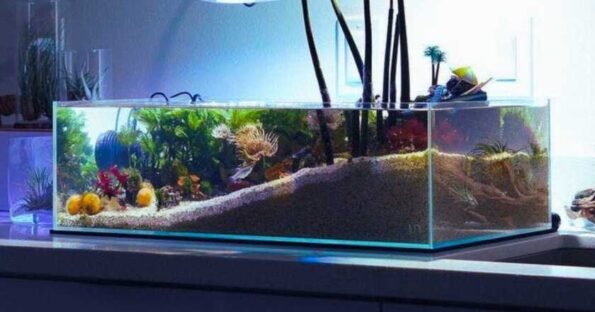Aquariums and ponds are both fascinating aquatic ecosystems that can enhance the beauty of any environment. However, despite their similarities, these two water bodies have distinct characteristics that determine the necessity of regular maintenance and cleaning. In this article, we will explore the fundamental differences between aquariums and ponds, the unique challenges they present, and the reasons why aquariums require diligent cleaning while ponds tend to be more self-sustaining.
Size and Scale
One of the primary distinctions between aquariums and ponds lies in their size and scale. Aquariums are confined, controlled environments, usually kept indoors, with limited water volume. Conversely, ponds are large, natural or man-made bodies of water, with a significantly larger water capacity. This size difference plays a crucial role in the maintenance requirements of both systems.
In an aquarium, the limited water volume means waste products, excess nutrients, and toxins can quickly accumulate, leading to deteriorating water quality and stressed aquatic life. On the other hand, ponds can dilute and disperse pollutants more effectively due to their larger size, reducing the immediate impact of waste accumulation.
Ecosystem Complexity
Aquariums are carefully designed to mimic natural aquatic ecosystems, often featuring diverse flora and fauna in a confined space. This artificial complexity is aesthetically pleasing but requires regular cleaning and maintenance to sustain a healthy balance. In contrast, ponds boast a more natural ecosystem with a greater capacity to self-regulate.
In a pond, various biological interactions take place, such as nutrient cycling, predation, and symbiosis, which contribute to the overall health and stability of the system. These ecological interactions maintain a certain level of equilibrium, making the pond less dependent on external maintenance interventions.
Filtration Systems
The filtration systems in both aquariums and ponds are vital for maintaining water quality. However, the type and efficiency of filtration systems differ significantly between the two environments.
Aquariums typically rely on mechanical, biological, and chemical filtration to remove debris, convert toxic ammonia into less harmful compounds, and control other water parameters. Despite advanced filtration technologies, aquariums still require regular cleaning to prevent the buildup of organic waste and ensure the system operates optimally.
In ponds, natural biological filtration is more prevalent. Beneficial bacteria colonize the pond’s surfaces, such as rocks and gravel, breaking down organic matter and purifying the water.
Additionally, aquatic plants play a crucial role in absorbing excess nutrients, promoting water clarity, and providing oxygen. These natural filtration processes contribute to the low maintenance requirements of ponds.
Species Selection
The choice of aquatic species also influences the maintenance needs of aquariums and ponds. Aquariums often feature delicate and sensitive fish and invertebrates that require pristine water conditions to thrive. Any imbalance in water quality can lead to stress, diseases, and fatalities among the inhabitants, necessitating diligent cleaning and monitoring.
In contrast, ponds tend to host hardier fish species, native aquatic plants, and a more diverse range of microorganisms. These organisms have evolved to withstand fluctuations in water quality, making ponds more resilient and self-sustaining.
Environmental Exposure
The location of an aquarium versus a pond greatly affects their exposure to external factors. Aquariums are typically situated indoors, shielded from direct sunlight and extreme weather conditions. This controlled environment allows for more precise regulation of water temperature, light, and other factors, but also demands more meticulous maintenance. Also, we need some types of equipment to measure and maintain the aquarium ecosystem.
Ponds, being outdoors, experience the full spectrum of natural conditions. Rainfall, sunlight, and seasonal changes contribute to the natural cleaning process. While ponds may require some initial setup and periodic maintenance, they can often strike a harmonious balance with nature over time.
Conclusion
In conclusion, the necessity for cleaning and maintenance in aquariums versus ponds arises from their distinct characteristics and designs. Aquariums, with their limited size and complex artificial ecosystems, demand consistent attention to prevent water quality issues and maintain the health of aquatic inhabitants. Conversely, ponds benefit from their larger size, natural ecological interactions, and self-regulating mechanisms, requiring less frequent and intensive intervention.
Whether you choose to set up an aquarium or create a pond, understanding the unique requirements of each system will help you foster a thriving aquatic environment that brings joy and fascination to your space.
